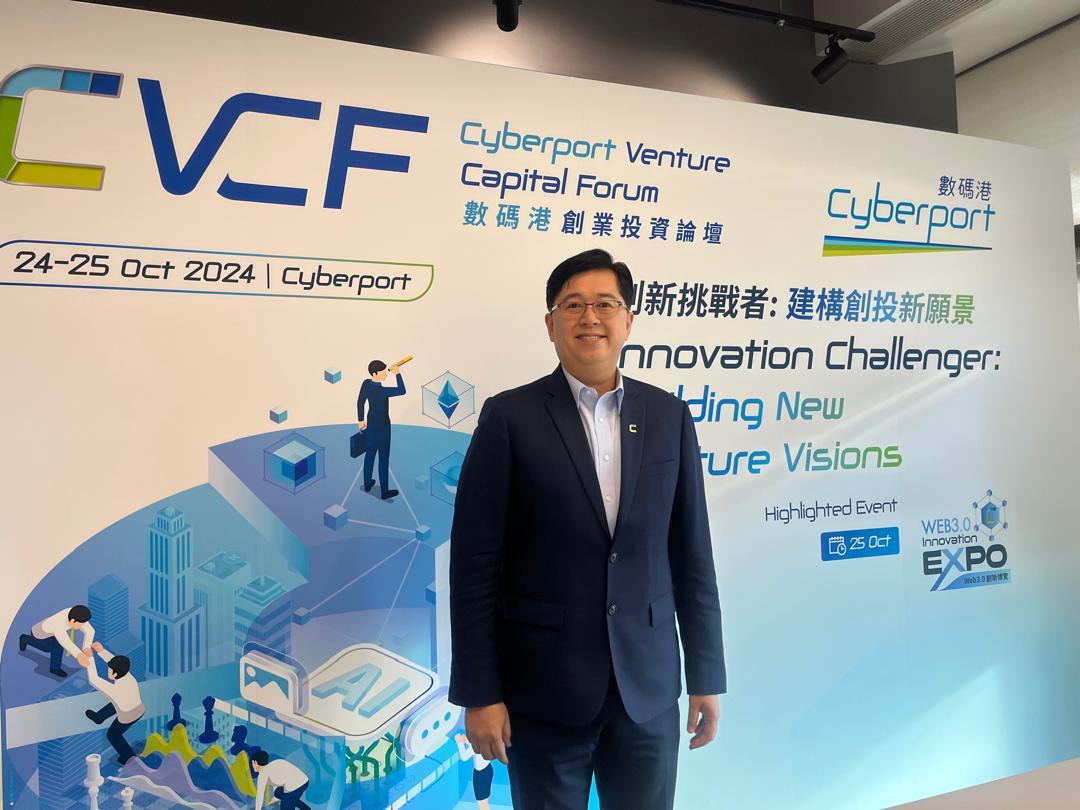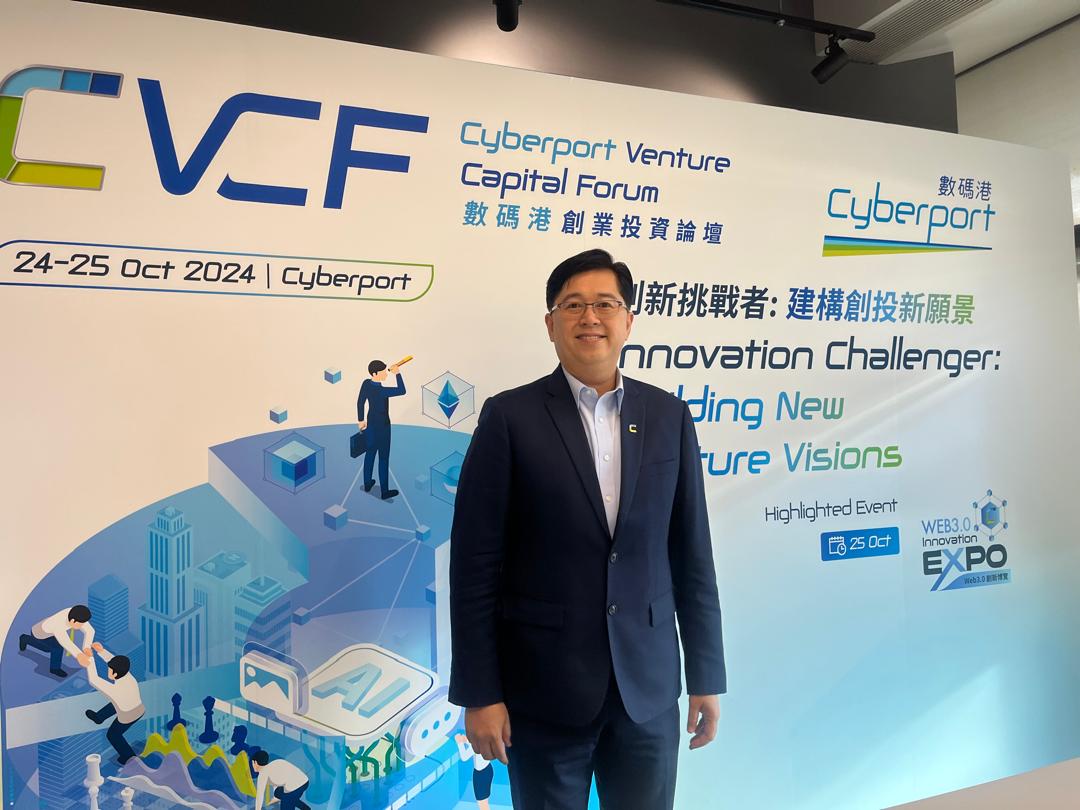An interview with Hong Kong’s Cyberport Chief Public Mission Officer Eric Chan – Part I

Editor’s note: TNGlobal’s reporter was invited to attend Cyberport Venture Capital Forum 2024 (CVCF 2024). (sponsored)
Cyberport is Hong Kong’s digital technology flagship and incubator for entrepreneurship with over 2,000 members including over 900 onsite and close to 1,100 offsite start-ups and technology companies. It is managed by Hong Kong Cyberport Management Co Ltd, wholly owned by the Hong Kong government.
With a vision to be the hub for digital technology, thereby creating a new economic driver for Hong Kong, Cyberport said it is committed to nurturing a vibrant tech ecosystem by cultivating talent, promoting entrepreneurship among youth, supporting start-ups, fostering industry development by promoting strategic collaboration with local and international partners, and integrating new and traditional economies by accelerating digital transformation in public and private sectors, information from its website showed.
In a recent interview with TNGlobal at the Cyberport Venture Capital Forum 2024 in Hong Kong, Cyberport Chief Public Mission Officer Eric Chan shared Cyberport’s plans, the tech ecosystem in Hong Kong, the city’s plan to become Web3 hub, among others.
“We continue to support Hong Kong in becoming the super-connector and a super value-adder for China, connecting to the rest of the world,” he said.
“We would like to help a lot of companies, not just the Hong Kong companies, but any company from around the region, from around the world, to use Hong Kong to access the Greater Bay Area of China, which has 86 million to 87 million population, more than 10 times of Hong Kong’s,” he shared.
In the interview, he also shared Cyberport’s longer-term vision and how it plans to position itself moving forward.

Below are the edited excerpts:
How is the tech ecosystem in Hong Kong? With more uncertainties, and geopolitical risks, how can Cyberport help startups in Hong Kong? What role can Cyberport play to help? What are the key areas in focus?
The tech ecosystem in Hong Kong is very vibrant, especially in recent years. We see a major growth in the startup tech ecosystem because of the government’s strong support. We have the policy, we have the resources.
According to a report, almost a year ago, Hong Kong has more than 4,500 tech startups and I’m sure maybe already surpassed 5,000 by now. In supporting technology entrepreneurs, we have been building a comprehensive ecosystem of startups, scaled-ups, as well as large corporation investors and various stakeholders. to ensure we have a good support system. This includes university, that the R&D.
At the end of the day, we want to provide the support for the tech companies, venture companies.
We have very comprehensive support programs to help entrepreneurs kick-start their startups to incubations, we have an acceleration program, a program that helps them to expand beyond Hong Kong, bringing them to other parts of the world too, so that they can operate in multiple markets and connect with other investors.
As everybody knows, talent is the most important thing for the tech startups. Under the government’s talent programs, we have been able to attract a lot of skilled talents, especially for the IT development, fostered by leading universities.
We hope that we would make available a lot of tech talents for our industries. We have quite a number of universities in Hong Kong. Five of them actually ranked the top 100 in the world. So our primary research is good and we also groom a lot of good talents.
Apart from our homegrown, organic growth, we also attract overseas talents through the aggressive fight for talent schemes.
Traditionally, Hong Kong has been a leading international finance center. That helps a lot because we will be able to raise funds, especially for late-stage companies, for IPOs or even M&A.
Due to the need to stay competitive as the international finance center, we are progressive in terms of FinTech innovations to ensure that Hong Kong stays at the top.
Hong Kong now ranked number three [in the Global Financial Center Index]. And I guess part of the reason is that we promote a lot of technology applications to support the finance industry.
Over the past few years, the government has put in a lot of resources and emphasis on pushing FinTech directly.
Regulators like the Hong Kong Monetary Authority has issued the Fintech 2025 strategy, and its first sentence is “all banks go FinTech” by 2025. Hong Kong would be a fundraising hub supported by all the FinTech innovations that we have made available.
You mentioned FinTech, so is there any other sector that are in focus?
Web3 is also one of the sectors in focus. Cyberport has been known as the digital technology hub of Hong Kong. We are now home to 2100 tech companies in our community, and obviously, we focus on digital tech.
We are very much focused on smart living/smart city development, which touches on all facets of the life of citizens, like health tech, social tech, and others. The third vertical is the digital entertainment.
For horizontal focus, we have AI, blockchain and cybersecurity. To add to this list is Web3. The government has announced that Hong Kong welcomes Web3 business and has started to issue Web3 related licenses for digital asset trading. Cyberport is also known as a Web3 hub of Hong Kong. We have now gathered over 270 Web3 companies here.
What is Cyberport’s longer-term vision? What is the strategic direction moving forward?
We would like to continue our effort in supporting tech entrepreneurs to kick-start their unicorn journey, using Hong Kong as a platform. Our vision is to make Cyberport available as a platform for any entrepreneurs to have the aspiration to grow in this part of the world, Asia.
We have the unique advantage of “one country, two systems”, and we have the big support from the Chinese government, while we are given the autonomy of running our own business.
Hong Kong has been named the top or the number one freest economy of the world. Our [startup] ecosystem is ranked first in Asia, and the third in the world.
We continue to support Hong Kong in becoming the super-connector and a super value-adder for China, connecting to the rest of the world.
We would like to help a lot of companies, not just the Hong Kong companies, but any company from around the region, from around the world, to use Hong Kong to access the Greater Bay Area of China, which has 86 million to 87 million population, more than 10 times of Hong Kong.
We have developed a lot of strategic partnerships around the regions like Malaysia, Thailand, Indonesia, Vietnam, and even all the way to the Middle East. We have been developing relationships with Saudi Arabia and UAE countries as well.
These are the focuses: to actually bring many of those companies using Hong Kong as a base and then expand to other parts of the world and definitely to the Greater Bay Area of China.
We also would like to position ourselves as the hub to help some good tech companies from Mainland China to come to Hong Kong, because primarily, many Mainland Chinese companies are domestic-driven. They have been running good businesses, with proven business model for the China market. And now many of them want to expand out of China, and the best place for them to kick-start this international development is to have a headquarters in Hong Kong, so that we can help them to go to other parts of the world.
One of the reasons is that Hong Kong uses Common Law. Hong Kong has international accounting standards that everybody understands, and we have great protections on intellectual property, and many support systems like the IP intellectual property arbitration, mediations and many support, to basically use Hong Kong as a testbed for the international market.
So it’s like a two-way traffic: international companies using Hong Kong to access China and the region, and then Chinese company using Hong Kong to go out of China. And from the technological perspective, one of the visions is we want to also help make Hong Kong the AI hub for China.
Cyberport has been commissioned to build the biggest AI Supercomputer Center for Hong Kong. The only reason we do it is because we want to make sure Hong Kong has the infrastructure to support AI development, and Hong Kong government has even put aside HK$3 billion to subsidize meaningful AI development.
So universities and institutions, even commercial corporates, they can actually apply to our subsidy program, and they could get up to 70 percent discount through the subsidy program.
We want people to have the necessary computer resources, to develop their AI. We are also working on the data part as well.
To be a successful AI. We need both the computer resources as far as data right to train the engine. We are working with some mainland parties as well, to make available some useful data for us to use in the AI.
Then it’s web3. We want to encourage people to explore the possibility of Web3. It’s still a journey. The definition of Web3 is still being defined.
Hong Kong as an international finance center, has a lot of applications, for in the finance industry. Apart from that, there are many other industries, can also do the Web3 transformations because of the unique propositions, the decentralization of securiy and ownership of data.
Since the end of 2022, we have been putting a lot of support for the Web3 development again.
I think Hong Kong is also the best place for many of these Web3 companies to use as a test bed. This will also give references to Mainland China as well. If things being tested and pilot run in Hong Kong in a sustainable and healthy way, maybe Mainland China, could refer to those applications and start promoting those applications, even in China. Hong Kong could be used as a testbed for some healthy applications or backroom technologies.
#Cyberport #HongKongTech #Web3Innovation #AIEcosystem #StartupSupport #Ifvex
- Art
- Causes
- Crafts
- Dance
- Drinks
- Film
- Fitness
- Food
- Игры
- Gardening
- Health
- Главная
- Literature
- Music
- Networking
- Другое
- Party
- Religion
- Shopping
- Sports
- Theater
- Wellness


